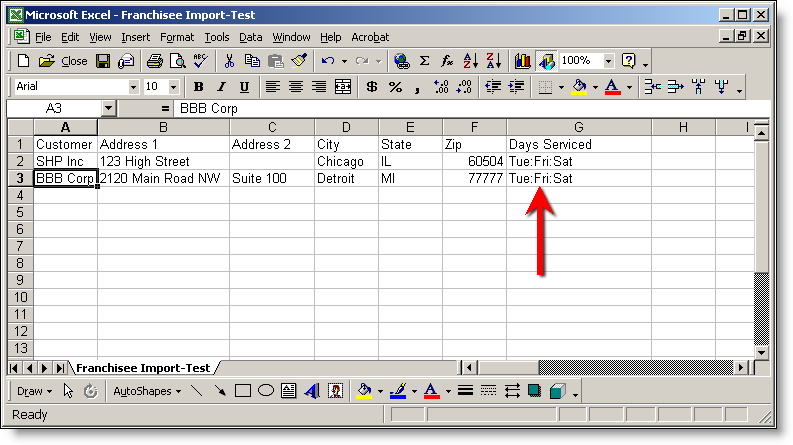Fields
Multi-Valued Fields
Fields to be imported that are of a multi-value type require special preparation within the import file. All the values to be imported must exist in between the delimiters of the file (tabs or commas), yet ExtraView must be able to distinguish between the different values. This is accomplished by using the system-wide delimiter in the behavior setting named DEFAULT_TEXT_REPORT_DELIMITER. This has a default value of the colon character “:”. Use this delimiter to distinguish values. For example, you may have a list with days of the week (Sun, Mon, Tue, Wed, Thu, Fri, Sat). If you need to indicate that the valid values of data within the record are Tue, Fri and Sat, you would use an entry of Tue:Fri:Sat on your spreadsheet:

Importing multi-valued fields
Text Fields
Fields that are to be mapped to Text Area, Log Area and Print Text display types have special treatment, to allow you to import values that contain a return character (ASCII 13). This character is normally used by many applications to indicate the end of data of a row. This implies that the data following the return character is a new record. Unfortunately, when you export a comma or tab delimited file from Excel or other applications, these return characters are treated as an end of record. To counteract this in a way acceptable to Excel and the import facility in ExtraView:
- Ensure new lines separated by a return character appear inside quoted strings (double quotes only). They will be transferred over into the record as is. In detail, carriage returns are discarded by ExtraView because they are non-existent within Unix files, and browsers behave correctly when they only receive a linefeed character
- Tab characters may be inserted into the record inside quotes (if tab-delimited) or anywhere (if comma-delimited). They will be carried over to the record as is.
- To get a double quote into a field, you need double it. Thus, “” represents one quote character. However, you can also put a double quote into a field if it is NOT the first non-whitespace character in a word. Thus, abc”def will carry across without modification, but “abcdef” will require modification.
User Name Fields
ExtraView expects to find user name in the import file in the same format as specified by the behavior setting USERNAME_DISPLAY. For example, this may be FIRST, LAST or ID. We recommend that for large imports where there may be more than one person with the same first and last name, that you import data using the ID setting. This will ensure that all users can be identified uniquely.
Maximum Field Sizes
Fields that are imported are subject to the maximum size constraints of their field types, and are as follows –
| Field / Field Type | Maximum size |
| List field titles (loaded as metadata) | 100 bytes |
| User ID (loaded as metadata) | 30 bytes |
| User First Name (loaded as metadata) | 128 bytes |
| User Last Name (loaded as metadata) | 128 bytes |
| SHORT_DESCR | 255 bytes |
| ALT_ID | 128 bytes |
| UDF text field display types | 256 bytes |
| UDF text area, log area, print text display types | Approx 10MBytes. Note that if you are using Microsoft Excel to prepare your input file, there is a 31k limit on the size of a cell. |
